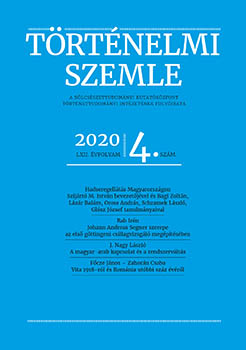A császári-királyi hadsereg ellátási rendszere a Magyar Királyságban az 1751. évi szabályzattól 1815-ig
The provision system of the imperial-royal army in the Hungarian Kingdom from the 1751 regulation to 1815
Author(s): Balázs LázárSubject(s): 18th Century, 19th Century
Published by: Magyar Tudományos Akadémia Bölcsészettudományi Kutatóközpont Történettudományi Intézet
Keywords: army provision; quartering; Imperial-Royal Army; Josephinism
Summary/Abstract: The compromise peace between the Hungarian estates and the Habsburg court that closed the Rákóczi revolt in 1711 set the framework for the provisioning of the imperial army which was stationed in Hungary. While the military leadership had to take into consideration the country’s interests, the estates had to acquiesce in the permanent presence of a foreign military on Hungarian soil, the provision of which, however, no more constituted an intolerable burden for a country in the process of regeneration after the end of Ottoman occupation. The supply of the army was predominantly made in kind (food and fodder) instead of in cash, in full accordance with the local conditions. Presenting the institutional framework and the regulations, the study shows that both the Hungarian political elite and the Viennese central administration made considerable efforts at regulating the coexistence of army and society, and at limiting the abuses of the military. As the reforms of Joseph II to re-regulate army provision by transforming the duties into a permanent tax proved ephemeral, the regulation of 1751 remained effective until as late as 1848.
Journal: Történelmi Szemle
- Issue Year: 2020
- Issue No: 04
- Page Range: 549-564
- Page Count: 16
- Language: Hungarian

